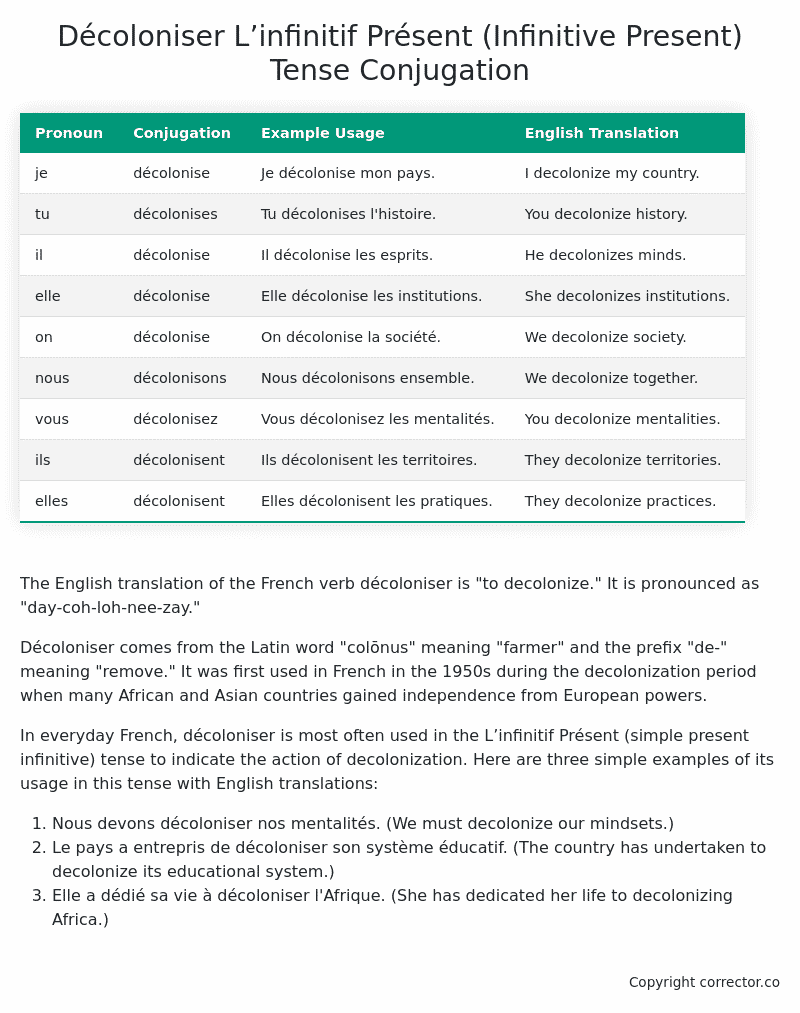L’infinitif Présent (Infinitive Present) Tense Conjugation of the French Verb décoloniser
Introduction to the verb décoloniser
The English translation of the French verb décoloniser is “to decolonize.” It is pronounced as “day-coh-loh-nee-zay.”
Décoloniser comes from the Latin word “colōnus” meaning “farmer” and the prefix “de-” meaning “remove.” It was first used in French in the 1950s during the decolonization period when many African and Asian countries gained independence from European powers.
In everyday French, décoloniser is most often used in the L’infinitif Présent (simple present infinitive) tense to indicate the action of decolonization. Here are three simple examples of its usage in this tense with English translations:
- Nous devons décoloniser nos mentalités. (We must decolonize our mindsets.)
- Le pays a entrepris de décoloniser son système éducatif. (The country has undertaken to decolonize its educational system.)
- Elle a dédié sa vie à décoloniser l’Afrique. (She has dedicated her life to decolonizing Africa.)
Table of the L’infinitif Présent (Infinitive Present) Tense Conjugation of décoloniser
| Pronoun | Conjugation | Example Usage | English Translation |
|---|---|---|---|
| je | décolonise | Je décolonise mon pays. | I decolonize my country. |
| tu | décolonises | Tu décolonises l’histoire. | You decolonize history. |
| il | décolonise | Il décolonise les esprits. | He decolonizes minds. |
| elle | décolonise | Elle décolonise les institutions. | She decolonizes institutions. |
| on | décolonise | On décolonise la société. | We decolonize society. |
| nous | décolonisons | Nous décolonisons ensemble. | We decolonize together. |
| vous | décolonisez | Vous décolonisez les mentalités. | You decolonize mentalities. |
| ils | décolonisent | Ils décolonisent les territoires. | They decolonize territories. |
| elles | décolonisent | Elles décolonisent les pratiques. | They decolonize practices. |
Other Conjugations for Décoloniser.
Le Present (Present Tense) Conjugation of the French Verb décoloniser
Imparfait (Imperfect) Tense Conjugation of the French Verb décoloniser
Passé Simple (Simple Past) Tense Conjugation of the French Verb décoloniser
Passé Composé (Present Perfect) Tense Conjugation of the French Verb décoloniser
Futur Simple (Simple Future) Tense Conjugation of the French Verb décoloniser
Futur Proche (Near Future) Tense Conjugation of the French Verb décoloniser
Plus-que-parfait (Pluperfect) Tense Conjugation of the French Verb décoloniser
Passé Antérieur (Past Anterior) Tense Conjugation of the French Verb décoloniser
Futur Antérieur (Future Anterior) Tense Conjugation of the French Verb décoloniser
Subjonctif Présent (Subjunctive Present) Tense Conjugation of the French Verb décoloniser
Subjonctif Passé (Subjunctive Past) Tense Conjugation of the French Verb décoloniser
Subjonctif Imparfait (Subjunctive Imperfect) Tense Conjugation of the French Verb décoloniser
Conditionnel Présent (Conditional Present) Tense Conjugation of the French Verb décoloniser
Conditionnel Passé (Conditional Past) Tense Conjugation of the French Verb décoloniser
L’impératif Présent (Imperative Present) Tense Conjugation of the French Verb décoloniser
L’infinitif Présent (Infinitive Present) Tense Conjugation of the French Verb décoloniser (this article)
Struggling with French verbs or the language in general? Why not use our free French Grammar Checker – no registration required!
Get a FREE Download Study Sheet of this Conjugation 🔥
Simply right click the image below, click “save image” and get your free reference for the décoloniser L’infinitif Présent tense conjugation!

Décoloniser – About the French L’infinitif Présent (Infinitive Present) Tense
Forming the Infinitive Present
Common Everyday Usage Patterns
As a Verb’s Dictionary Form
After Modal Verbs
As an Imperative
In Infinitive Clauses
Interactions with Other Tenses
Present Tense
Future Tense
Conditional Tense
Passé Composé
Imperfect Tense
Subjunctive and Conditional Moods
Summary
Want More?
I hope you enjoyed this article on the verb décoloniser. Still in a learning mood? Check out another TOTALLY random French verb conjugation!


